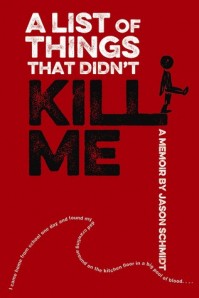A List of Things That Didn’t Kill Me, by Jason Schmidt
This review of Jason Schmidt's memoir, “A List of Things That Didn’t Kill Me,” was published January 2015 in The Seattle Times.
 “A List of Things That Didn’t Kill Me” is billed as memoir and aimed at young-adult audiences. But both categories slap a needlessly limiting label on what is, most of all, a powerful testament to right-there-beside-you child poverty.
“A List of Things That Didn’t Kill Me” is billed as memoir and aimed at young-adult audiences. But both categories slap a needlessly limiting label on what is, most of all, a powerful testament to right-there-beside-you child poverty.
In another era — say, that of Frank Conroy’s 1967 memoir “Stop-Time,” which used fictional techniques to describe Conroy’s interior life — the tale of Schmidt’s upbringing from toddler to teen, might have been hailed as an arresting coming-of-age novel, without fussing about genre and target markets.
It opens with the terrifying scene of young Jason walking into his Seattle kitchen to find his father covered in blood, and then rolls backward to trace the path that led them there. We ride along as Jason, age 3, tricycles alone through the streets.
We watch him witness his father busted by undercover narcotics officers and taken to jail. We see Jason eating powered milk flecked with mouse droppings; wearing clothes that stink; feeling giddy when odd-job pay elevates the Schmidts’ household income above flat-out destitution.
Because many names have been changed and some identities combined into composites, memoir purists will grumble. And parents may blanch at tweens digging through 400 pages of drug use, beatings and life on the margins, though Schmidt recounts it all with a pleasantly mordant tone.
“When my dad got tired of listening to me complain about how bored I was, he’d give me a serrated steak knife and tell me to mow the lawn with it,” Schmidt writes about life, age 5. “I’d spend hours out in the front yard, cutting clumps of grass loose from the dirt, trying to make them all a nice, uniform height. Sometimes it was the high point of my week.”
Pain is standard. Absurdity a constant. At Christmastime, Jason watches a child psychologist dressed as Santa Claus rummaging through his closet in search of the used Legos she’d given him a few weeks before, because now she wants to give them to someone else.
“That’s all?” she asks the bewildered child, hoisting a bag, Grinch-style, over her shoulder.
“Yes,” he answers.
“Great,” she says. “Sorry to wake you.”
Schmidt writes vividly of Seattle before tech was king. It’s a tired, weather-beaten city, where cougars follow the railroad tracks into Ballard, Lake Union is populated by retirees scraping by on workers’ comp and poor kids haunt the streets.
In one stunning anecdote 11-year-old Jason, his friend and that boy’s 12-year-old sister wander downtown streets all night, playing in the Seattle Center’s abandoned carnival rides and frozen fountains until morning, when whatever adult is nominally in charge allows them home again.
There are a lot of failed parents in “A List of Things,” most notably Schmidt’s dad, a gay, drug-addicted petty criminal who raises the boy in a series of flop houses, squats and shared apartments. (Schmidt’s mother, described as a mentally ill artist who relinquished custody, barely appears.)
Many assertions here are built on the strength of Schmidt’s memories. Are they all factual? It hardly matters. The power of this book comes through its perspective. Schmidt’s narrator is the 10-year-old you’ve seen wandering winter streets without a coat; the kid you’ve wondered about as he ambles arcades during school hours.
It’s a window onto the way those experiences feel to a child, and viewed through this criteria, brutally credible.
Click here for my Q&A with Schmidt.
